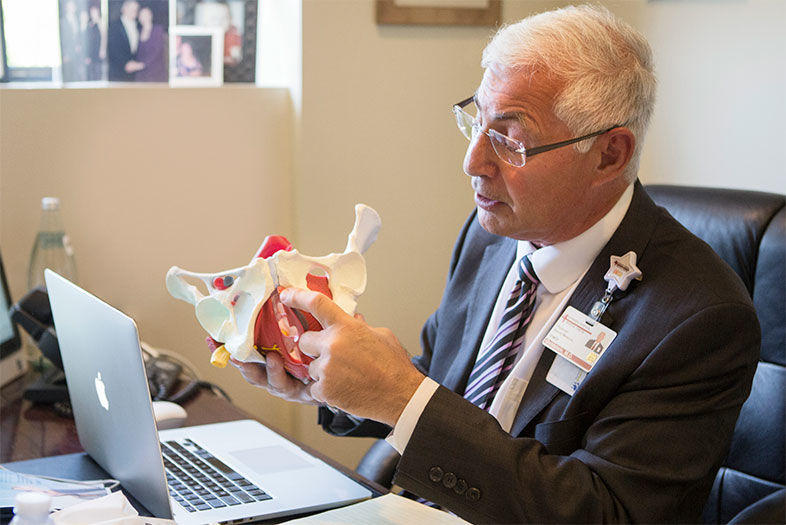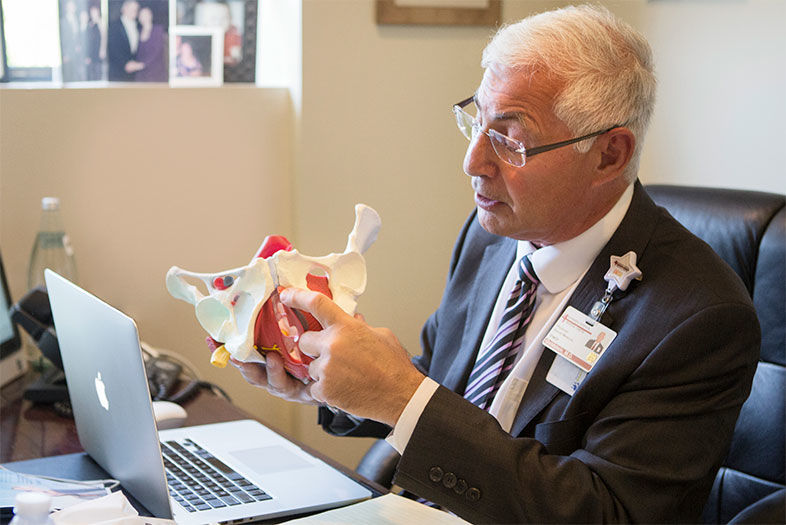Mary Trevellyan spent 25 years and more than $200,000 trying to remedy her constant vaginal pain. She might’ve resigned herself to a lifetime of discomfort had she not found Alvarado Hospital’s San Diego Sexual Medicine clinic, the first hospital-based program of its kind in the nation.
Clinic director Dr. Irwin Goldstein quickly recognized Trevellyan’s problem as “provoked vestibulodynia,” a condition characterized by pain at the vestibule where the vulva meets the vagina.
“No one was able to get me out of pain until Dr. Goldstein,” Trevellyan says. “I went to many pelvic pain specialists, trying treatment after treatment. Within a minute, he knew what my problem was and how to treat it.”
She underwent a vestibulectomy to remove sensitive tissue, Botox injections to her pelvic floor, and physical therapy to retrain her muscles.
“It’s like I hit the reset button,” she says, explaining that she is now pain-free. “He ended 25 years of suffering.”
Goldstein, a native of Quebec who began his career in Boston as a urologist, founded San Diego Sexual Medicine a decade ago to address the unmet diagnosis and treatment needs of men and women with sexual health problems. The 5,700-square-foot College East–area clinic has a staff of 15, including a physical therapist, sex therapist, nurse-practitioners, and a clinical research manager who also happens to be his wife, Sue Goldstein.
The clinic’s patients travel from all over the world, and range from 9-year-olds with persistent genital arousal disorder to 90-year-olds who’d still like to be sexually active.
But sexual health is an investment: The clinic doesn’t accept insurance, because most plans don’t cover their services.
Social stigma prevents many from seeking help for sexual dysfunctions, and according to Goldstein, a conservative political climate limits the availability of federal funding for research in the field.
“There are more people with sexual problems than people with breast cancer, than people with prostate cancer, than people with arthritis, yet medicine hasn’t taken it on using all the skills and diagnostic tests typical for medical professionals,” he says.
Patients for whom sex has become difficult or painful can benefit from an array of surgical procedures, prosthetics, sex-boosting prescriptions like Addyi and Viagra, and off-label uses of drugs typically prescribed for anxiety, depression, and even Parkinson’s disease.
“I am able to say to the man with erectile dysfunction, ‘There’s no reason for you to have erectile dysfunction. If you can’t stand it, I can help you,’” Goldstein says. “There isn’t a man on earth that I can’t make potent.”
Daniel Canfield jokes that he was “born limp.” His erectile dysfunction, caused by corporal fibrosis, bothered him from an early age. Viagra and penile vacuum pump devices didn’t work. Dr. Goldstein ultimately determined that Canfield was a candidate for penile implant surgery.
“The implant has changed my life,” Canfield says. “It makes a man bionic.”
“Men worry that erectile dysfunction is the death of their sex life, but there’s nothing to be afraid of,” Canfield says. “It’s not a death sentence. There are ways through it.”
Difficulties in the bedroom can be indicative of larger health problems, too, from spinal issues to blocked arteries to emotional strain. It’s worth getting checked out.
“Our goal is to make the intimate sex life more satisfying to the patient,” Goldstein says. “Where we think of this as a psychosocial issue, at the end of the day it’s an engineering problem. I have this fabulous perspective of sexuality through engineering that allows me to take a man or woman with a really horribly personal, very frustrating, embarrassing situation and say, ‘Okay, this is like getting help for your toe or your finger or your nose.’”

“There Isn’t a Man on Earth That I Can’t Make Potent”
PARTNER CONTENT
Dr. Irwin Goldstein | Photo: Becca Batista


















